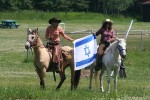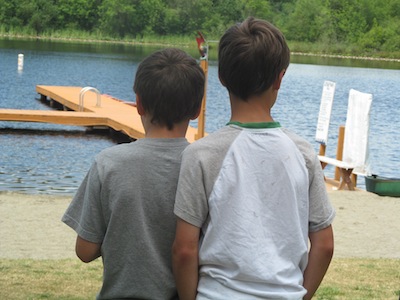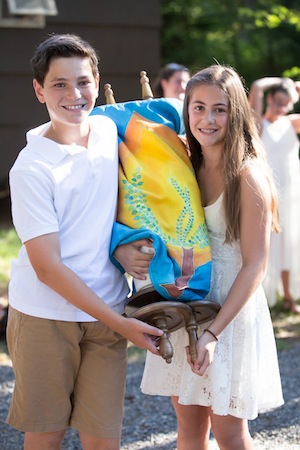Shabbat, Dec. 21
Vayeishev, Genesis 37:1-40:23
I am a rabbi because of a game of catch I played at camp with a rabbi more than three times my age. I found love and happiness and my partner in life because my best friend and my family helped me through a very difficult time. I survived the social pressure cooker of high school because my woodshop teacher took a personal interest in my well-being. I am alive today, I truly believe, because an anonymous man pulled me back from the curb as I was about to step into oncoming traffic in Manchester, England. (I was looking in the wrong direction for British traffic patterns.)
We have all sorts of names for these people in our lives. Some call them guardian angels, some call them heroes, and our tradition calls them shlichim, “messengers” or “emissaries” from God. I call them supporting actors. A rabbi, a friend, family, a teacher and an anonymous man in the movie that is my life: these are the people who have enabled me to play a starring role!
These are the people who, intentionally or not, gave the trajectory of my life a nudge at just the right moment and kept it on track, or steered it in a new and better direction. If awards were given to supporting actors in life as they are to movie actors, then they would each deserve an Oscar for the roles they played and for how their playing of their roles enabled me to play mine.
Who are the supporting actors in your life? Who are the people, past or present, who, at critical crossroads in your life’s journey, gave you directions, held your hand and walked a bit of the way with you? Who are the people who, upon reflection, were it not for them, everything would be different and so much would not have been possible?
Consider for a moment the story of Joseph and his coat of many colours in this week’s Torah portion, Vayeishev.
Here, we meet Joseph, son of Jacob, grandson of Isaac, great-grandson of Abraham, who, by all accounts, is a leading man in the story of the Jewish people. Joseph, in my estimation, is the second most pivotal person in Jewish history. The most pivotal one is a man whose name we don’t know and the Torah doesn’t record, but whose role as a supporting actor in one scene of Joseph’s life changes the arc of Jewish history.
In this week’s portion, Joseph goes out searching for his brothers, who are supposed to be in the field tending the flock. He searches in all the usual places but can’t find them. Along the way, he meets a man whose name we never know: the Torah refers to him simply as ha-ish, “the man” who saw Joseph wandering in the field (Genesis 37:15).
There is an allusion here to the nameless man or angel that Jacob, Joseph’s father, wrestled with in the previous parashah, Vayishlach. We note that, sometimes, when the Torah does not name a character, that character comes to play a pivotal role in the unfolding story. Such is the case in this instance. The man sees that Joseph appears to be lost and approaches him. He asks: “What are you looking for?” Joseph responds, “I’m looking for my brothers. Can you tell me please where they are tending the flock?” (See Genesis 37:15-16.)
The nameless man remembers seeing Joseph’s brothers, he overheard them talking about heading toward a place called Dothan. On the anonymous man’s advice, Joseph seeks his brothers there and finds them. Shockingly, they are not happy to see him. They conspire against him, abuse him, threaten to kill him and, eventually, sell him into slavery to a band of traveling nomads who are headed to Egypt. Through a series of events, Joseph, the boy who looked for his brothers in a field, becomes the chief advisor to Pharaoh and ascends to the second-most powerful position in all of Egypt.
Meanwhile, a famine occurs in the Land of Israel and these same brothers are sent by the leader of the Israelites, their father Jacob, to find food. They travel to Egypt and, this time, it is they who are surprised to find their brother – not only alive, but also in a position to help them. After a series of encounters, Joseph embraces them, asks after his father and makes all the arrangements for the entire nation of Israel to immigrate to Egypt. His position and power save the Jewish people and, for many years, they live well in Egypt and thrive.
Then, a new pharaoh comes to power and forces the Israelites into slavery. A prophet named Moses rises up from among them and, through plagues of frogs, lice, boils and so on; the splitting of the Red Sea; and, ultimately, the giving of the Torah, the people return to the Land of Israel. And that’s pretty much the story of our people.
But what about this nameless man? Who or what was he?
The commentators offer a variety of answers. The 11th-century scholar, Abraham ibn Ezra, reads the text of Genesis 37:15 with a p’shat, a “straightforward” interpretation and concludes this was a passerby. Rashi, on the other hand, delves further and concludes: “This [the man] was the angel Gabriel, as it says (Daniel 10:21), ‘and the man Gabriel.’” (Rashi on Genesis 37:15) Rashi draws inference from the definite article that is used to identify “the” man.
Ramban explains that he was an ordinary man (a passerby), yet he was unwittingly fulfiling God’s design. He was actually “sent” by God to guide Joseph, though he himself was not aware of the significance of his actions. In Hebrew, the word malach means both “angel” and “messenger,” because every malach, human or supernatural, is one of God’s messengers, activated to implement His will on earth. (See Ramban on Genesis 37:15.)
Menachem Mendel Morgensztern of Kotzk, known as the Kotzker Rebbe (1787-1859), goes in a completely different direction: “The angel taught Joseph that, whenever one is straying in the ways of life, when one is downtrodden or downcast, one should speak to oneself and clarify for oneself what one is really asking for, looking for, seeking, and what one really desires, so that one can return and first explain to oneself what one needs.”
The Kotzker Rebbe seems to disagree with Ramban, Rashi and Ibn Ezra, saying, it’s not a passerby, God or an angel that points the way. Rather, he says that the supporting actor in this unfolding mystery is Joseph’s inner voice and that, sometimes, our inner voice can be our own supporting actor.
Whatever or whoever he was, were it not for ha-ish, the man Joseph met along the way, the man who told Joseph where to find his brothers, how different it all could have been.
We never know in the present tense which people or events will be the most instrumental and transformative in our lives but, in hindsight, nothing is clearer. Upon reflection, the pieces of the puzzle and the paths of our lives are perfectly clear, even if they may be filled with uncomfortable observations.
This week’s parashah is a reminder to all of us to recognize the supporting actors who have guided us on our path and pointed us to our direction. It compels us to acknowledge, honour and thank them – even to give them awards – for the important roles that they’ve played, for doing so teaches us something greater still: in recognizing the transformative influence of supporting actors in our lives, we become keenly aware of how important we are in the lives of others. And we come to appreciate the capacity each of us has to help our friends, neighbours, even strangers achieve wholeness in life and find what they are seeking.
Rabbi Dan Moskovitz is senior rabbi at Temple Sholom and author of The Men’s Seder (MRJ Publishing). He is also chair of the Reform Rabbis of Canada. His writing and perspective on Judaism appear in major print and digital media internationally. This article originally appeared on reformjudaism.org.



